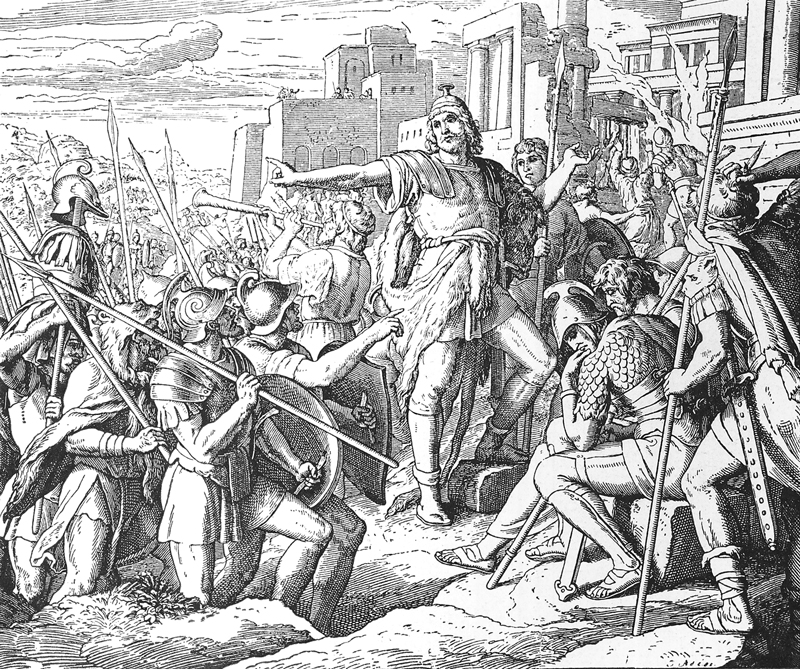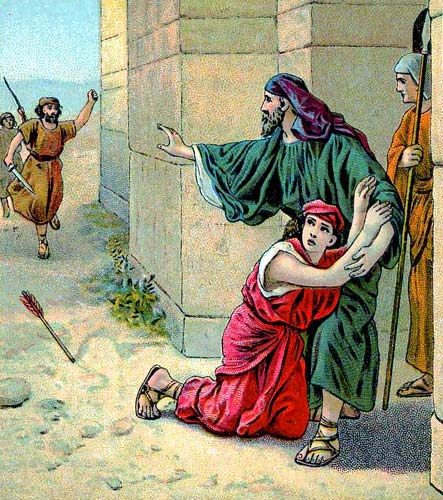|
Bosor
Bosor () was an ancient Biblical Levitical city and one of the three Trans-Jordanian Cities of Refuge named in the Mosaic Law. It was located in Gilead, and was conquered by Judas Maccabeus. 1 Maccabees 5:26, 36 It is sometimes identified with modern-day Busra al-Harir. Josephus Flavius Josephus (; grc-gre, Ἰώσηπος, ; 37 – 100) was a first-century Romano-Jewish historian and military leader, best known for ''The Jewish War'', who was born in Jerusalem—then part of Roman Judea—to a father of priestly d ... commented on its conquest. References External linksJewish Encyclopedia article Levitical cities Gilead {{Coord, 32.837990, 36.339007, display=title ... [...More Info...] [...Related Items...] OR: [Wikipedia] [Google] [Baidu] |
Cities Of Refuge
The cities of refuge ( ''‘ārê ha-miqlāṭ'') were six Levitical towns in the Kingdom of Israel and the Kingdom of Judah in which the perpetrators of accidental manslaughter could claim the right of asylum. Maimonides, invoking talmudic literature, expands the city of refuge count to all 48 Levitical cities. Outside of these cities, blood vengeance against such perpetrators was allowed by law. The Bible names the six cities as being cities of refuge: Golan, Ramoth, and Bosor, on the east (left bank) of the Jordan River, and Kedesh, Shechem, and Hebron on the western (right) side. Biblical regulations In Numbers In the Book of Numbers, the laws concerning the cities of refuge state that, once he had claimed asylum, a perpetrator had to be taken from the city and put on trial; if the trial found that the perpetrator was innocent of murder, then the perpetrator had to be returned under guard (for their own protection) to the city in which they had claimed asylum. This law co ... [...More Info...] [...Related Items...] OR: [Wikipedia] [Google] [Baidu] |
Busra Al-Harir
Busra al-Harir ( ar, بصر الحرير ''Buṣra al-Ḥarīr'', also spelled ''Busr al-Hariri, Basr al-Harir, Busra Hariri'') is a town in southern Syria, part of the Daraa Governorate situated in the Hauran plain. It is located northeast of Daraa and northwest of as-Suwayda. Nearby localities include Maliha al-Atash to the southeast, al-Shaykh Maskin to the east, Izra to the northeast, Harran to the northwest, Najran to the west, al-Mazraa to the southwest and Nahitah to the south. In the 2004 census by the Central Bureau of Statistics (CBS) Busra al-Harir had a population of 13,315. Towards the end of Ottoman rule in Syria, the residents of Busra al-Harir engaged in regular clashes with the residents of Jabal al-Druze. In 1879 fighting flared up between the townspeople and the Druze after the Muslim inhabitants of several nearby villages fled to Busra al-Harir as a result of fighting between the al-Atrash family, a leading Druze clan, and the local Bedouin. With pressure from ... [...More Info...] [...Related Items...] OR: [Wikipedia] [Google] [Baidu] |
Bible
The Bible (from Koine Greek , , 'the books') is a collection of religious texts or scriptures that are held to be sacred in Christianity, Judaism, Samaritanism, and many other religions. The Bible is an anthologya compilation of texts of a variety of forms originally written in Hebrew, Aramaic, and Koine Greek. These texts include instructions, stories, poetry, and prophecies, among other genres. The collection of materials that are accepted as part of the Bible by a particular religious tradition or community is called a biblical canon. Believers in the Bible generally consider it to be a product of divine inspiration, but the way they understand what that means and interpret the text can vary. The religious texts were compiled by different religious communities into various official collections. The earliest contained the first five books of the Bible. It is called the Torah in Hebrew and the Pentateuch (meaning ''five books'') in Greek; the second oldest part was a coll ... [...More Info...] [...Related Items...] OR: [Wikipedia] [Google] [Baidu] |
Transjordan (Bible)
Transjordan ( he, עבר הירדן, ) is an area of land in the Southern Levant lying east of the Jordan River valley. It is also alternatively called Gilead. Etymology In the Hebrew Bible, the term used to refer to the future Transjordan is he, עבר הירדן (), "beyond the Jordan". This term occurs, for example, in the Book of Joshua (). It was used by people on the west side of the Jordan, including the biblical writers, to refer to the other side of the Jordan River. In the Septuagint, the he, בעבר הירדן מזרח השמש (מזרחית לנהר הירדן), hay·yar·dên miz·raḥ, lit=beyond the Jordan towards the sunrise is translated to grc, πέραν τοῦ Ιορδάνου,, translit. péran toú Jordánou,, beyond the Jordan. The term was translated to la, trans Iordanen, lit=beyond the Jordan in the Vulgate Bible. However some authors give the he, עבר הירדן, Ever HaYarden, lit=beyond the Jordan, as the basis for Transjordan, which is als ... [...More Info...] [...Related Items...] OR: [Wikipedia] [Google] [Baidu] |
Torah
The Torah (; hbo, ''Tōrā'', "Instruction", "Teaching" or "Law") is the compilation of the first five books of the Hebrew Bible, namely the books of Genesis, Exodus, Leviticus, Numbers and Deuteronomy. In that sense, Torah means the same as Pentateuch or the Five Books of Moses. It is also known in the Jewish tradition as the Written Torah (, ). If meant for liturgic purposes, it takes the form of a Torah scroll ('' Sefer Torah''). If in bound book form, it is called ''Chumash'', and is usually printed with the rabbinic commentaries (). At times, however, the word ''Torah'' can also be used as a synonym for the whole of the Hebrew Bible or Tanakh, in which sense it includes not only the first five, but all 24 books of the Hebrew Bible. Finally, Torah can even mean the totality of Jewish teaching, culture, and practice, whether derived from biblical texts or later rabbinic writings. The latter is often known as the Oral Torah. Representing the core of the Jewish spiri ... [...More Info...] [...Related Items...] OR: [Wikipedia] [Google] [Baidu] |
Gilead
Gilead or Gilad (; he, גִּלְעָד ''Gīləʿāḏ'', ar, جلعاد, Ǧalʻād, Jalaad) is the ancient, historic, biblical name of the mountainous northern part of the region of Transjordan.''Easton's Bible Dictionary''''Galeed''/ref> The region is bounded in the west by the Jordan River, in the north by the deep ravine of the river Yarmouk and the region of Bashan, and in the southwest by what were known during antiquity as the “plains of Moab”, with no definite boundary to the east. In some cases, “Gilead” is used in the Bible to refer to all the region east of the Jordan River. Gilead is situated in modern-day Jordan, corresponding roughly to the Irbid, Ajloun, Jerash and Balqa Governorates. Gilead is also the name of three people in the Hebrew Bible, and a common given name for males in modern-day Israel. Etymology Gilead is explained in the Hebrew Bible as derived from the Hebrew words , which in turn comes from ('heap, mound, hill') and ('witness, te ... [...More Info...] [...Related Items...] OR: [Wikipedia] [Google] [Baidu] |
Judas Maccabeus
Judah Maccabee (or Judas Maccabeus, also spelled Machabeus, or Maccabæus, Hebrew: יהודה המכבי, ''Yehudah HaMakabi'') was a Jewish priest (''kohen'') and a son of the priest Mattathias. He led the Maccabean Revolt against the Seleucid Empire (167–160 BCE). The Jewish holiday of Hanukkah ("Dedication") commemorates the restoration of Jewish worship at the Second Temple in Jerusalem in 164 BCE, after Judah Maccabee removed all of the statues depicting Greek gods and goddesses and purified it. Life Early life Judah was the third son of Mattathias the Hasmonean, a Jewish priest from the village of Modi'in. In 167 BCE Mattathias, together with his sons Judah, Eleazar, Simon, John, and Jonathan, started a revolt against the Seleucid ruler Antiochus IV Epiphanes, who since 175 BCE had issued decrees that forbade Jewish religious practices. After Mattathias's death in 166 BCE, Judah assumed leadership of the revolt in accordance with the deathbed disposition of his ... [...More Info...] [...Related Items...] OR: [Wikipedia] [Google] [Baidu] |
1 Maccabees
The First Book of Maccabees, also known as First Maccabees (written in shorthand as 1 Maccabees or 1 Macc.), is a book written in Hebrew by an anonymousRappaport, U., ''47. 1 Maccabees'' in Barton, J. and Muddiman, J. (2001)The Oxford Bible Commentary, p. 711 Jewish author after the restoration of an independent Jewish kingdom by the Hasmonean dynasty, around the late 2nd century BC. The original Hebrew is lost and the most important surviving version is the Greek translation contained in the Septuagint. The book is held as canonical scripture by the Catholic, Orthodox, and Oriental Orthodox churches (except for the Orthodox Tewahedo), but not by Protestant denominations nor any major branches of Judaism; it is not part of the Hebrew Bible. Some Protestants consider it to be an apocryphal book (see also Deuterocanonical books). 1 Maccabees is best known for its account of an early victory in the Maccabean Revolt against the Seleucid Empire: the recapture of Jerusalem in the year ... [...More Info...] [...Related Items...] OR: [Wikipedia] [Google] [Baidu] |
Josephus
Flavius Josephus (; grc-gre, Ἰώσηπος, ; 37 – 100) was a first-century Romano-Jewish historian and military leader, best known for ''The Jewish War'', who was born in Jerusalem—then part of Roman Judea—to a father of priestly descent and a mother who claimed royal ancestry. He initially fought against the Romans during the First Jewish–Roman War as head of Jewish forces in Galilee, until surrendering in 67 AD to Roman forces led by Vespasian after the six-week siege of Yodfat. Josephus claimed the Jewish Messianic prophecies that initiated the First Jewish–Roman War made reference to Vespasian becoming Emperor of Rome. In response, Vespasian decided to keep Josephus as a slave and presumably interpreter. After Vespasian became Emperor in 69 AD, he granted Josephus his freedom, at which time Josephus assumed the emperor's family name of Flavius.Simon Claude Mimouni, ''Le Judaïsme ancien du VIe siècle avant notre ère au IIIe siècle de notre ère : Des ... [...More Info...] [...Related Items...] OR: [Wikipedia] [Google] [Baidu] |
Levitical Cities
In the Hebrew Bible, the Levitical cities were 48 cities in ancient Israel set aside for the tribe of Levi, who were not allocated their own territorial land when the Israelites entered the Promised Land. Numbers 35:1-8 relates God's command to Moses to establish 48 cities for the Levites, of which six would also function as Cities of Refuge to which manslayers could flee. Each settlement was to comprise a walled city and the common land around it for pasture, measured radially as one thousand cubits in each direction, or as a square measuring two thousand cubits along each side. The land for the cities was to be 'donated' by the host tribe and was allocated to the Levites according to their tribal sub-divisions. 13 cities were for the Aaronites. 13 cities were for the Gershonites. 10 cities were for the Kohathites. 12 cities were for the Merarites. The six cities which were to be Cities of Refuge were Golan, Ramoth, and Bezer, on the east of the Jordan River, and Kedesh, Sh ... [...More Info...] [...Related Items...] OR: [Wikipedia] [Google] [Baidu] |

.jpg)




